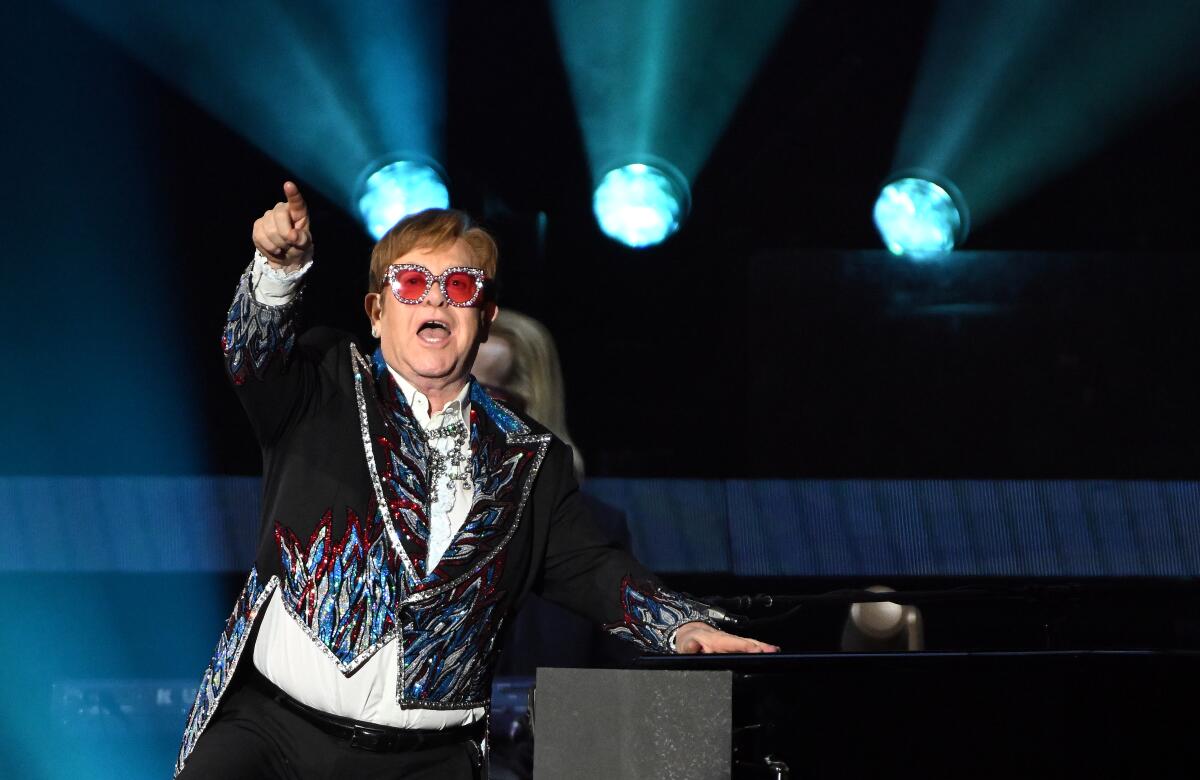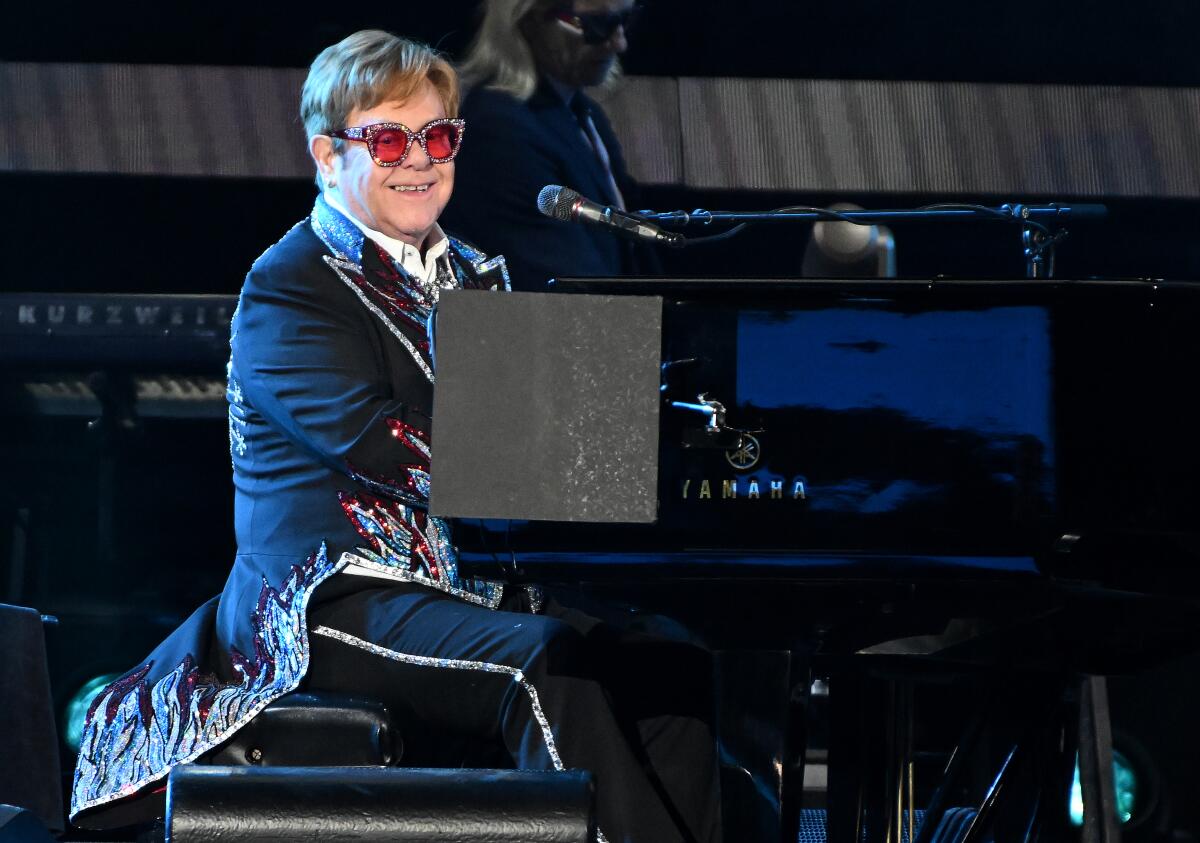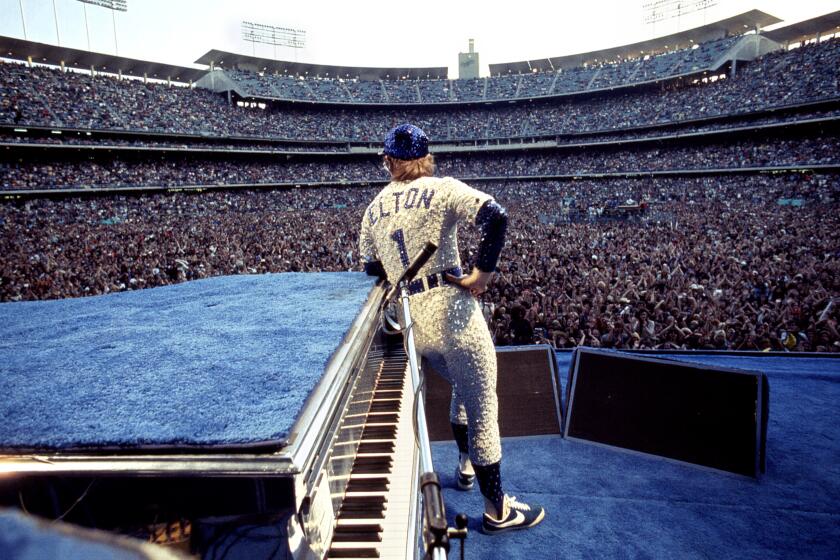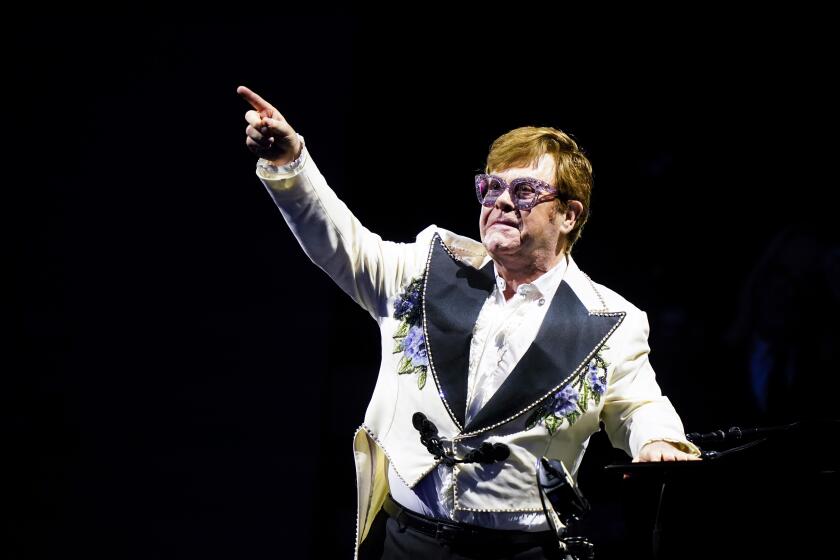In a giant sing-along, the sun goes down on Elton John at Dodger Stadium

- Share via
Elton John had already worn two different bedazzled suits — the first one made him look like a lion tamer, the second a fabulous cabinet secretary — by the time he reached the encore of his concert Thursday night at Dodger Stadium. But as one of music’s greatest living showmen, the 75-year-old pop legend knew his audience was waiting to see one particular outfit. So when he ambled back onstage just a few minutes after having ripped through “Saturday Night’s Alright for Fighting,” he did it in a glittering white-and-blue Dodgers bathrobe with matching ball cap and glasses — a callback, of course, to the iconic sequined Dodgers uniform he poured himself into while performing at the same spot in 1975.
Back then John was cementing his status as the starriest of superstars with two shows he rightfully described in his 2019 memoir as “a complete triumph.” On Thursday, nearly half a century later, he was kicking off a three-night stand at Dodger Stadium that he says will serve as his final American gigs as he approaches the end of a globe-circling farewell tour. “Tonight is the 269th show on the Farewell Yellow Brick Road tour,” he told the crowd, adding that it was his 101st show in the Los Angeles area and his fifth time playing Dodger Stadium. (Sunday’s finale will be livestreamed on Disney+ and will feature special guests including Dua Lipa, Brandi Carlile and the singer’s old pal Kiki Dee.)
Much has happened since John launched the Farewell Yellow Brick Road tour — so named after the smash 1973 double LP with which it almost shares a title — four years ago in 2018. For one thing, COVID disrupted his carefully plotted road plans, which is why the show will head to Australia and Europe next year before finally wrapping for good (after having become the third-highest-grossing tour in history, with ticket sales of more than $600 million). More happily, John saw his life dramatized on the big screen in 2019’s splashy “Rocketman” biopic and hit the top 10 of Billboard’s Hot 100 for the first time since the late ’90s with his sleek Dua Lipa duet, “Cold Heart.” This past summer he charted even higher with another shrewdly conceived collaboration, “Hold Me Closer,” which has him and Britney Spears mashing up several of his oldies including the deathless “Tiny Dancer.”
Beginning Thursday, Elton John will play his final U.S. concerts at Dodger Stadium, where, in 1975, he donned a sequined Dodgers uniform and made music history.
Taking in the sight of thousands of fans dressed Thursday in tinted specs and feather boas — not to mention an ambitious few in sparkly full-body replicas of John’s Dodgers uniform — you couldn’t help but think about the crucial groundwork he laid for peacocking pop stars such as Harry Styles and Bad Bunny.
Yet for all the legacy-burnishing of the last few years, this 2½-hour show was less about mythology than about music: Leading a rock-solid six-piece band filled with guys he’s been playing with for decades (including drummer Nigel Olsson, percussionist Ray Cooper and guitarist Davey Johnstone), John performed nearly two dozen of his best-known tunes like a man who still gets a kick out of plopping down behind a piano and letting it rip.
He took long, florid solos in “Rocket Man” and “Sorry Seems to Be the Hardest Word” and bashed out funky barrelhouse grooves in “Take Me to the Pilot” and “I Guess That’s Why They Call It the Blues.” He played with tempo in “Bennie and the Jets,” stretching out the negative space in the song’s swaggering glam-R&B beat, and tweaked the shapely melody of “Tiny Dancer,” clearly taking pleasure in toying with an audience in full sing-along mode. He let his musicians get their jollies too, making room for Johnstone to peel off a series of hot licks in “Have Mercy on the Criminal” and directing the crowd’s attention to Cooper’s climactic moment on the tympani drums in “Someone Saved My Life Tonight.”

John’s robust vocals are probably the strongest of anyone from his generation still out there playing shows; he could be playful and growly, as in “Philadelphia Freedom,” or lushly sentimental, as in “Don’t Let the Sun Go Down on Me,” which he dedicated to some of the bandmates he’s lost over the years. Occasionally he’d adjust a skyscraping melody to better suit a range that’s lowered as he’s gotten older. But then he’d come back in the next song and nail the high note everyone was hearing in their heads, as in a stirring take on “Levon.”
Lots of heritage acts with catalogs the size of John’s — Paul McCartney, say — will shorten some of their tunes in concert to make room on the set list for more; John did the opposite, forsaking the medley approach to tack on a rowdy New Orleans-style coda to “Rocket Man” and finishing “Burn Down the Mission” with a foot-stomping gospel breakdown. He was letting the songs breathe, and why not? As he moved from the soulful “Border Song” to the driving “Sad Songs (Say So Much)” to the tough and glittery “The Bitch Is Back,” you had to marvel at the intricate constructions he’d devised for Bernie Taupin’s lyrics — the elaborate structures, the false endings, the little trap doors that drop you into what feels like an entirely new song until you sense a second before he changes course that, nope, he’s still singing “Funeral for a Friend/Love Lies Bleeding.”
Elton John is scheduled to play his final North American show Sunday night at Dodger Stadium in Los Angeles. Here’s how to watch the action from home.
Put it this way: I can’t remember the last time I was so far inside the music at a stadium show that a confetti blast actually surprised me, as it did here at the end of that rollicking “Saturday Night.” Once John came back out in that shimmering bathrobe — the Vegas-tasteful stage set resembled nothing so much as a Cheesecake Factory, by the way — he did “Cold Heart,” then bragged for a second about its chart success before singing “Your Song,” which he pointed out had been his first hit more than 50 years earlier. (Hey, an icon’s work is never done.) But John closed by introducing — what else? — “Goodbye Yellow Brick Road” with a heartfelt thanks to his fans for buying his records and dressing up at his shows and generally keeping him in business for so long.
“I love to play live, and I love to see your faces,” he said, and he sounded prepared to give up only one of those things.
More to Read
The biggest entertainment stories
Get our big stories about Hollywood, film, television, music, arts, culture and more right in your inbox as soon as they publish.
You may occasionally receive promotional content from the Los Angeles Times.












